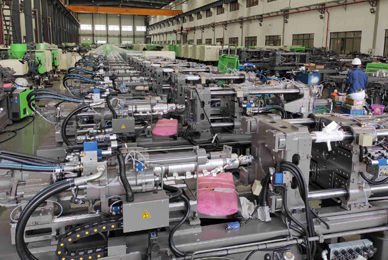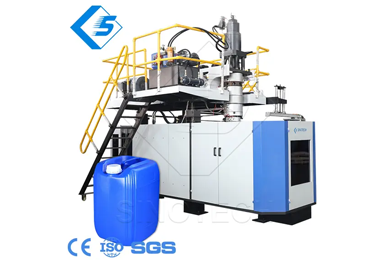
Packaging plays a critical role in the agrochemical industry, especially when it comes to pesticides. The challenges faced by pesticide packaging are unique and demanding. These containers must ensure chemical stability to prevent degradation or contamination of the product, as well as guarantee leak-proof performance to avoid environmental hazards and health risks associated with accidental spills.
As agrochemical products become more diverse and regulatory standards more stringent, the demand for high-quality, safe, and reliable pesticide bottles has surged. In response, blow molding machines have become increasingly popular in the production of pesticide packaging. Their ability to create durable, customizable, and chemically resistant containers makes them an ideal manufacturing solution for this industry.
1. Key Applications in Agrochemical Packaging
Pesticide packaging is not a one-size-fits-all matter. Depending on the chemical formulation, application, and regulatory requirements, pesticide bottles come in various types, sizes, and structures. Blow molding machines offer the versatility to manufacture a wide range of these containers efficiently.
Single-Layer Pesticide Bottles
Single-layer bottles, often made from HDPE, are commonly used for less aggressive pesticides or formulations that do not require special barrier properties. These bottles provide sufficient chemical resistance and mechanical strength for everyday use. Blow molding machines can produce these containers with excellent dimensional accuracy and surface finish, ensuring a professional look while maintaining safety.
Multi-Layer and Barrier Bottles
Some pesticides contain aggressive chemicals or volatile compounds that may degrade conventional plastic containers over time or allow permeation of gases and liquids. For these applications, multi-layer blow molding is essential. Multi-layer bottles incorporate barrier layers, such as EVOH (ethylene vinyl alcohol) or other polymers, sandwiched between HDPE layers to enhance chemical resistance and reduce permeability.
Blow molding machines capable of multi-layer production can deliver these advanced containers with precise control over layer thickness and composition, thereby extending the shelf life and safety of pesticide products.
Leak-Proof and Tamper-Resistant Designs
Given the hazardous nature of pesticides, containers often need to feature leak-proof seals and tamper-evident closures. Blow molding technology enables the integration of specialized neck finishes and thread designs compatible with child-resistant caps or tamper-proof closures, preventing accidental exposure or product contamination.
Various Capacities and Structural Designs
Pesticide bottles vary in size from small 100ml bottles for household use to large 5-liter or 10-liter containers for agricultural bulk applications. Blow molding machines support rapid tool changeovers and process adjustments to accommodate these capacity variations.
Furthermore, structural features such as ergonomic grips, stackable shapes, and reinforced walls for enhanced durability can be incorporated easily using blow molding. This flexibility supports manufacturers in meeting diverse market demands efficiently.
2. Why Blow Molding Is Ideal for Pesticide Bottles
Blow molding technology offers distinct advantages that make it especially suitable for pesticide bottle production, particularly when paired with the appropriate materials and integrated labeling options.
Chemical Resistance of HDPE Material
High-Density Polyethylene (HDPE) is the material most commonly used in pesticide bottle manufacturing due to its excellent chemical resistance. HDPE’s dense molecular structure forms an effective barrier against corrosive chemicals, solvents, and UV exposure — common challenges in pesticide packaging.
This resistance ensures that the pesticide product remains stable throughout its shelf life without compromising the integrity of the bottle. HDPE bottles also maintain flexibility and toughness, preventing cracking or leakage during handling and transport.
Compatibility with In-Mold Labeling and Anti-Counterfeiting
The agrochemical industry increasingly faces risks from counterfeit products, which can endanger crops, users, and ecosystems. Blow molding machines facilitate the integration of in-mold labeling (IML) technology, where labels are molded directly into the bottle during the manufacturing process.
IML produces durable, high-quality graphics that resist abrasion, fading, and chemical damage, enhancing product appeal and consumer trust. It also reduces post-molding labeling steps, improving production efficiency.
In addition to labeling, blow molding enables the addition of anti-counterfeiting features such as embossed logos, tamper-evident neck rings, and multi-layer constructions that make refilling or counterfeiting difficult.

3. Main Benefits for Manufacturers
Blow molding machines provide manufacturers with operational and economic advantages that directly impact productivity, product quality, and profitability.
Cost-Effectiveness and Mold Durability
Blow molding utilizes robust steel molds that offer long lifespans, often exceeding hundreds of thousands of cycles. This durability significantly lowers tooling costs over time compared to other molding technologies.
Material usage efficiency is another major benefit. Excess plastic from parison trimming can often be recycled directly back into production, reducing waste and raw material costs.
High Automation Levels
Modern blow molding machines incorporate sophisticated automation systems for precise temperature control, parison thickness regulation, and real-time quality inspection. This reduces manual intervention, minimizes errors, and ensures consistent production quality.
Automation also allows seamless switching between different product designs and batch sizes, enhancing manufacturing flexibility.
Scalability and Flexibility
Blow molding lines can be configured for high-volume continuous production or smaller, more agile batches to meet diverse market demands. Quick mold changes and programmable process parameters enable pesticide manufacturers to adapt to product changes without significant downtime.
This scalability allows businesses to remain competitive, manage inventory effectively, and respond swiftly to regulatory or market trends.
4. SINOTECH’s Custom Solutions for Pesticide Bottle Production
SINOTECH Machinery Co., Ltd. understands the specialized needs of the agrochemical packaging industry and has developed tailored blow molding machines to address them efficiently.
Machines Designed for the Agrochemical Sector
SINOTECH offers a range of blow molding machines specifically engineered for pesticide bottle manufacturing. These machines support both single-layer and multi-layer production, accommodating a variety of chemical barrier requirements.
Their designs prioritize machine stability, energy efficiency, and ease of operation, ensuring reliable, continuous output with minimal downtime.
Precision Temperature Control and Wall Thickness Distribution
SINOTECH blow molding equipment features cutting-edge temperature control systems that maintain uniform resin heating, ensuring consistent parison quality. Their advanced parison programming technology controls wall thickness distribution with high precision, crucial for producing bottles that meet stringent chemical resistance and strength requirements.
Automation and Intelligent Controls
SINOTECH machines incorporate smart automation features such as automatic mold change, integrated quality monitoring, and user-friendly interfaces. These allow manufacturers to optimize production, reduce waste, and maintain product quality consistently.
Comprehensive Support and After-Sales Service
Beyond delivering high-performance machinery, SINOTECH provides expert technical support, training, and maintenance services. Their dedicated team assists customers in optimizing production processes and maximizing machine lifespan.
Conclusion
The growing complexity and safety demands of pesticide packaging call for advanced manufacturing solutions that ensure product integrity and regulatory compliance. Blow molding technology, combined with HDPE material advantages and modern automation, is the ideal method to produce high-quality, chemically resistant, and secure pesticide bottles.
Manufacturers benefit from blow molding’s cost efficiency, scalability, and adaptability, enabling them to meet market demands effectively while maintaining profitability.
SINOTECH Machinery Co., Ltd. offers customized blow molding solutions designed specifically for the agrochemical industry, providing precision control, energy-efficient designs, and comprehensive support to help producers excel in this challenging market.
To explore SINOTECH’s blow molding machines, request detailed specifications, or receive a personalized consultation, visit www.sinotechmachine.com and discover how their technology can transform your pesticide bottle production.

















